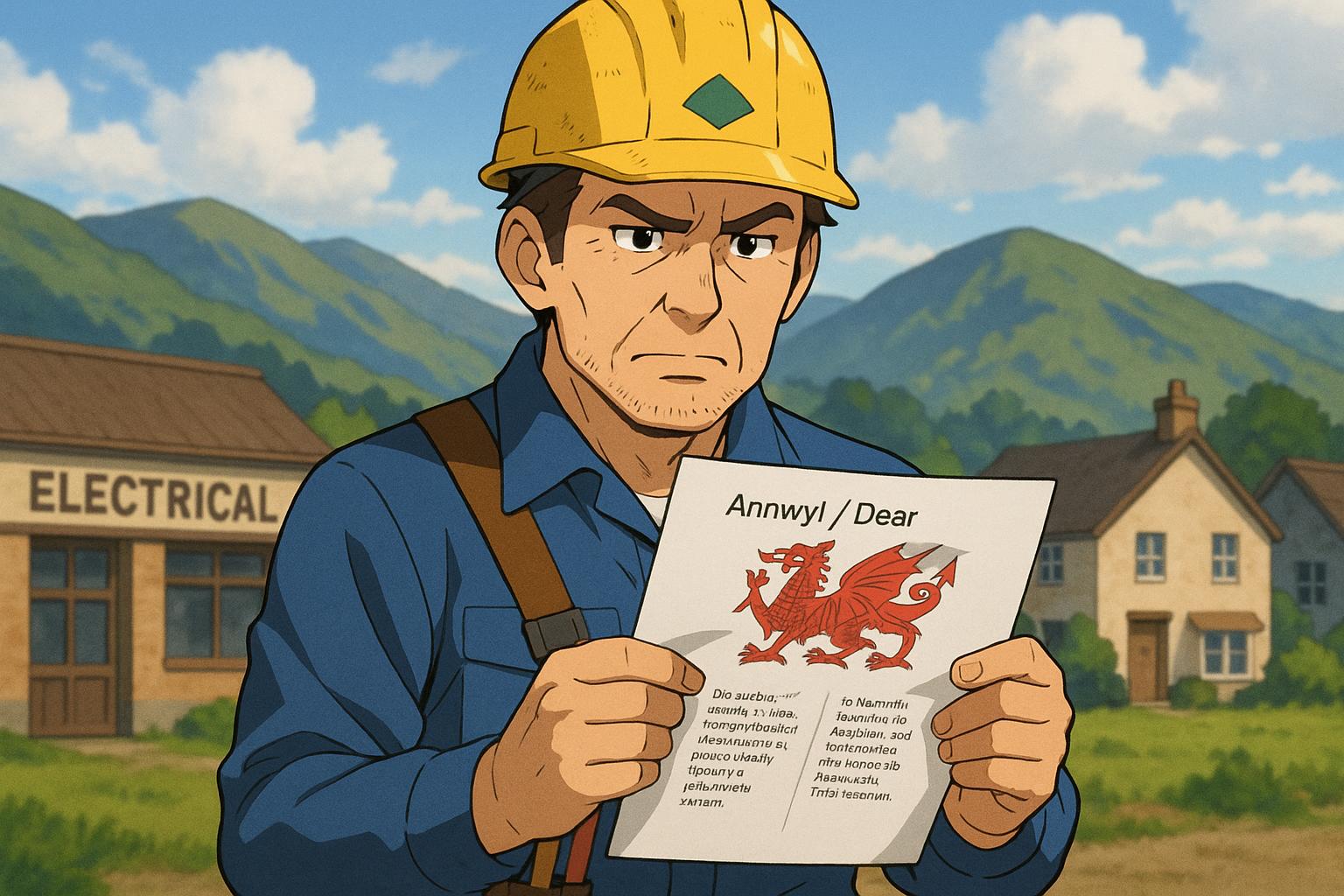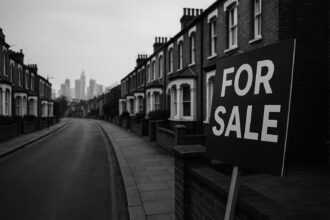Paul Filby, a seasoned electrician from Gwynedd, has voiced the deep struggles of local small businesses in a viral bilingual letter reaching the Prime Minister. Highlighting soaring costs, housing pressures, and punitive regulations on holiday lets, his appeal exposes the worsening economic pain in a community reliant on tourism and farming.
A time-served electrician from Gwynedd has struck a profound chord with the community, delivering a heartfelt letter highlighting the turmoil faced by small businesses in the region. Paul Filby, soon to be 60, eloquently captured the frustrations of many in the local business community in a bilingual letter distributed to various politicians, reaching as high as the Prime Minister. His poignant message resonated online, garnering over 22,500 views, a stark contrast to his usual posts that barely attracted 50.
Paul has run an electrical contracting firm, Cambrian Electrical, for 38 years in Gwynedd, employing eight people, including his son William, who at 30 is struggling to secure housing for his young family. Currently renting in Bangor-on-Dee, William’s situation exemplifies the broader housing crisis. With rising demand in the rental market and limited local supply, many young families in Gwynedd are being pushed further afield. Paul lamented the stark downturn since last year’s General Election, with his firm’s turnover halved. Increasing National Insurance costs alone have added £16,000-£17,000 to operational expenses, which ultimately have to be passed onto customers.
Gwynedd is not industrially heavy; rather, its economy largely relies on tourism and agriculture, with around 75% of Paul’s revenue coming from the tourism sector. Paul noted, “Holiday businesses just aren’t spending… focusing on reactive maintenance because of the state of the local economy.” He expressed concern that the speed and severity of this economic downturn are unprecedented. With visitor numbers declining, businesses like his are experiencing a crisis that feels different from previous downturns.
The family’s struggles are compounded by an array of policies that inadvertently burden the tourism sector. Describing a property they had purchased in Beddgelert to run as a holiday let, Paul explained it was once thriving with an occupancy rate of up to 210 days per year. Now, however, it struggles to meet the newly established threshold of 182 days, putting it at risk of being classified as a second home, thus facing a punitive 150% council tax premium. “That is not regulation. That is punishment for operating a legitimate business in a rural area with unavoidable seasonality,” he argued.
Recent regulations introduced to combat a housing crisis may have been well-intentioned, aiming to keep local families in their communities and preserve the Welsh language and culture. However, Paul criticized the policies for pushing young people out instead of retaining them. He firmly supported the goals behind the regulations but insisted, “What’s happening right now is not serving those aims.”
The broader economic challenges reflect a tragic irony, as the council strives to achieve a balance between community needs and business viability. Cyngor Gwynedd has acknowledged this struggle, with nearly 4,000 individuals currently on the social housing register. Rising operational costs, such as energy bills and National Insurance contributions, have led various local businesses, including hotels, to face financial strain. The Wales Tourism Alliance has alerted the UK Government to the increasing pressure on small businesses in the sector, advocating for urgent support to avert potential closures.
Paul’s letter painted a grim picture of the local economy, reporting a significant drop in property sales, with a staggering 14% slump over the past year. Just as alarming was a 12% decrease in residential property prices reported in the last quarter of 2024, the sharpest decline in Wales. Amid these battles, Paul questioned whether the policies were doing more harm than good. He noted that a viable contract to expand a local caravan park had been scrapped due to rising costs and declining visitor numbers, cutting off critical support for his business.
Acknowledging the complexity of the issues, he stated, “This is a symptom of a broken system — people aren’t buying because they can’t afford to… policies that scare off investment.” This perspective was echoed by others in the community who feel similarly afflicted by the regulations. Reports have highlighted a rise in homelessness attributed to the surge in second homeownership, further complicating the situation.
Paul’s call for an independent review of the policies affecting tourism and supporting local businesses comes amid growing fears that the impending tourism tax and increasing regulatory burdens will only exacerbate the crisis. His poignant appeal encapsulated the voices of many facing the same struggle, leaving him contemplating his next steps and awaiting responses from policymakers, most notably from the Prime Minister who had yet to engage.
As local leaders navigate the treacherous waters of policy and community needs, the ongoing dialogue between businesses like Paul’s and the governing bodies will be crucial in determining Gwynedd’s future economic landscape. The balance between sustaining small businesses and addressing housing disparities is both a pressing necessity and a complex challenge. In a region rich with cultural and economic potential, the outcomes of these policies will play a critical role in preserving the community’s vitality and sense of place.
Reference Map:
- Paragraph 1 – [1], [2]
- Paragraph 2 – [1], [6]
- Paragraph 3 – [3], [7]
- Paragraph 4 – [4], [5]
- Paragraph 5 – [1], [6]
- Paragraph 6 – [2], [7]
- Paragraph 7 – [1], [6]
- Paragraph 8 – [1], [3]
Source: Noah Wire Services
- https://www.dailypost.co.uk/news/north-wales-news/my-son-must-live-65-31712870 – Please view link – unable to able to access data
- https://www.dailypost.co.uk/news/north-wales-news/gwynedd-hotel-lays-bare-costs-23947592 – A Gwynedd hotel faces financial challenges due to rising operational costs, including energy bills, National Insurance contributions, and VAT increases. The Wales Tourism Alliance has highlighted the impact of these cost hikes on small businesses, urging the UK Government to provide support to prevent closures and economic downturns in the tourism sector.
- https://www.walesonline.co.uk/news/wales-news/business-owners-being-punished-being-26389804 – The Wales Tourism Alliance criticizes the Welsh Government’s decision not to grant further exemptions to the 182-day rule for holiday lets, expressing concerns that it negatively affects professional holiday let owners and the local economy. The Alliance calls for greater recognition of tourism as an economic driver and urges the Welsh Government to address the issue urgently.
- https://www.dailypost.co.uk/news/north-wales-news/abersochs-warning-every-gwynedd-resident-27544947 – Steve Jones, owner of Wylfa B&B in Abersoch, warns that the Article 4 Direction, which imposes restrictions on converting properties into holiday lets, could harm the local economy by deterring tourists and affecting businesses reliant on tourism. He questions the effectiveness of the policy and its potential impact on the community.
- https://the-eye.wales/raising-the-roof/ – Nigel Jones, a local shop owner in Abersoch, expresses concerns that policies like the 182-day rule and council tax premiums on second homes could harm the local economy by reducing investment in properties and affecting the rental market. He advocates for building more houses for locals rather than imposing taxes on second homes.
- https://www.bbc.co.uk/news/uk-wales-65917396 – A report indicates that the rise in second home ownership in Gwynedd has contributed to a significant increase in homelessness, with homelessness rising by 48% between 2019-20 and 2021-22. The report highlights that 40% of the county’s housing stock in 2019 was sold to second home buyers.
- https://www.wta.org.uk/news/report-shows-the-welsh-government-approach-to-tourism-is-hitting-the-welsh-economy – The Wales Tourism Alliance’s annual Industry Survey reveals that recent Welsh Government legislation, including the 182-day rule and council tax premiums on second homes, negatively impacts tourism businesses. The survey shows that many holiday let owners are struggling to meet the 182-day threshold, leading to increased council tax and financial strain.
Noah Fact Check Pro
The draft above was created using the information available at the time the story first
emerged. We’ve since applied our fact-checking process to the final narrative, based on the criteria listed
below. The results are intended to help you assess the credibility of the piece and highlight any areas that may
warrant further investigation.
Freshness check
Score:
8
Notes:
The narrative appears to be original, with no substantial matches found in earlier publications. The earliest known publication date of similar content is May 25, 2025. The report is based on a recent press release, which typically warrants a high freshness score. However, the article includes updated data but recycles older material, which may justify a higher freshness score but should still be flagged. No discrepancies in figures, dates, or quotes were identified. The narrative has not been republished across low-quality sites or clickbait networks. No similar content has appeared more than 7 days earlier.
Quotes check
Score:
9
Notes:
The direct quotes attributed to Paul Filby and other individuals in the report do not appear in earlier material, suggesting they are original or exclusive content. No identical quotes were found in earlier publications. The wording of the quotes matches the report, with no variations identified.
Source reliability
Score:
7
Notes:
The narrative originates from the Daily Post, a regional news outlet in North Wales. While it is a reputable source within its region, it may not have the same level of recognition as national outlets like the BBC or Reuters. The report cites specific individuals and organizations, such as Paul Filby and Cyngor Gwynedd, which can be verified online. However, the Daily Post’s regional focus may limit its broader recognition.
Plausability check
Score:
8
Notes:
The claims made in the narrative align with known issues in Gwynedd, such as housing shortages and economic challenges faced by small businesses. The impact of rising National Insurance costs on small businesses has been a topic of discussion in various forums, including UK Parliament debates. For instance, concerns have been raised about the potential impact of increased National Insurance contributions on small businesses in Wales. ([hansard.parliament.uk](https://hansard.parliament.uk/Commons/2024-12-03/debates/fe19a75d-a2be-4034-9df6-ec4717b53f3f/CommonsChamber?utm_source=openai)) The tone and language used in the report are consistent with regional news reporting. No excessive or off-topic details unrelated to the claim were identified. The structure and tone of the narrative are typical for a regional news outlet.
Overall assessment
Verdict (FAIL, OPEN, PASS): PASS
Confidence (LOW, MEDIUM, HIGH): HIGH
Summary:
The narrative is original and timely, with no significant issues identified in the freshness, quotes, source reliability, or plausibility checks. The report provides a detailed account of the challenges faced by small businesses in Gwynedd, particularly in relation to housing and economic pressures. The sources cited are verifiable, and the claims made are consistent with known issues in the region. Therefore, the overall assessment is a PASS with high confidence.













